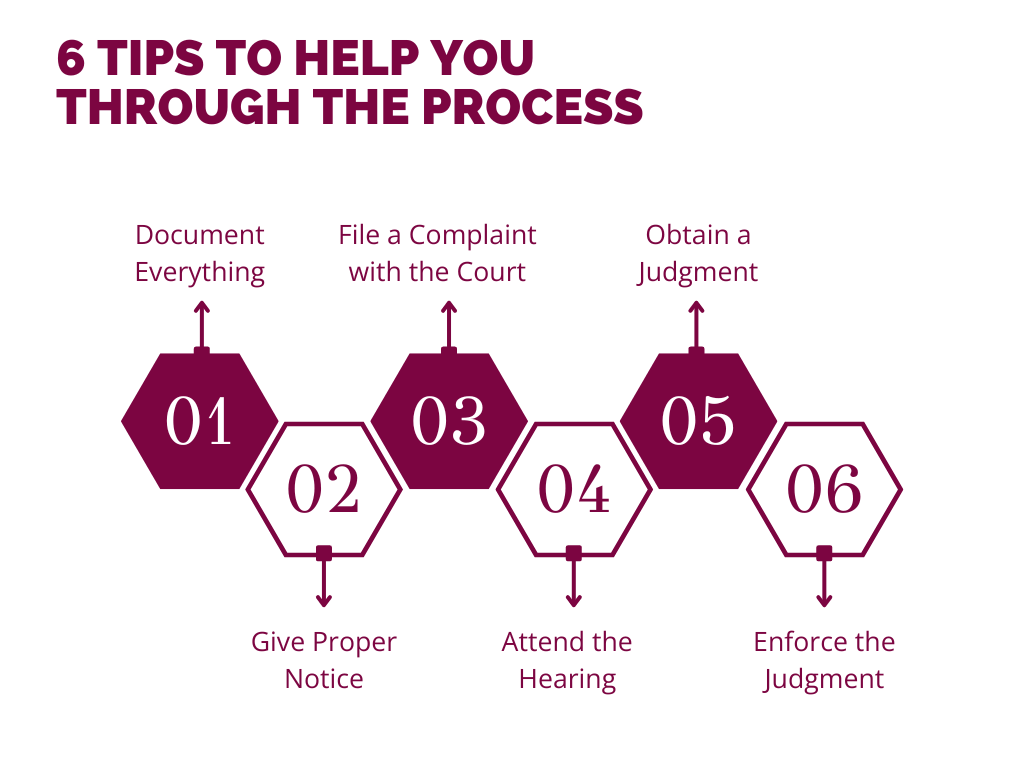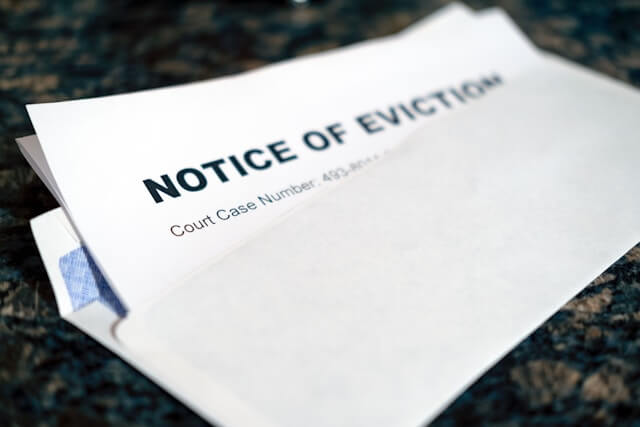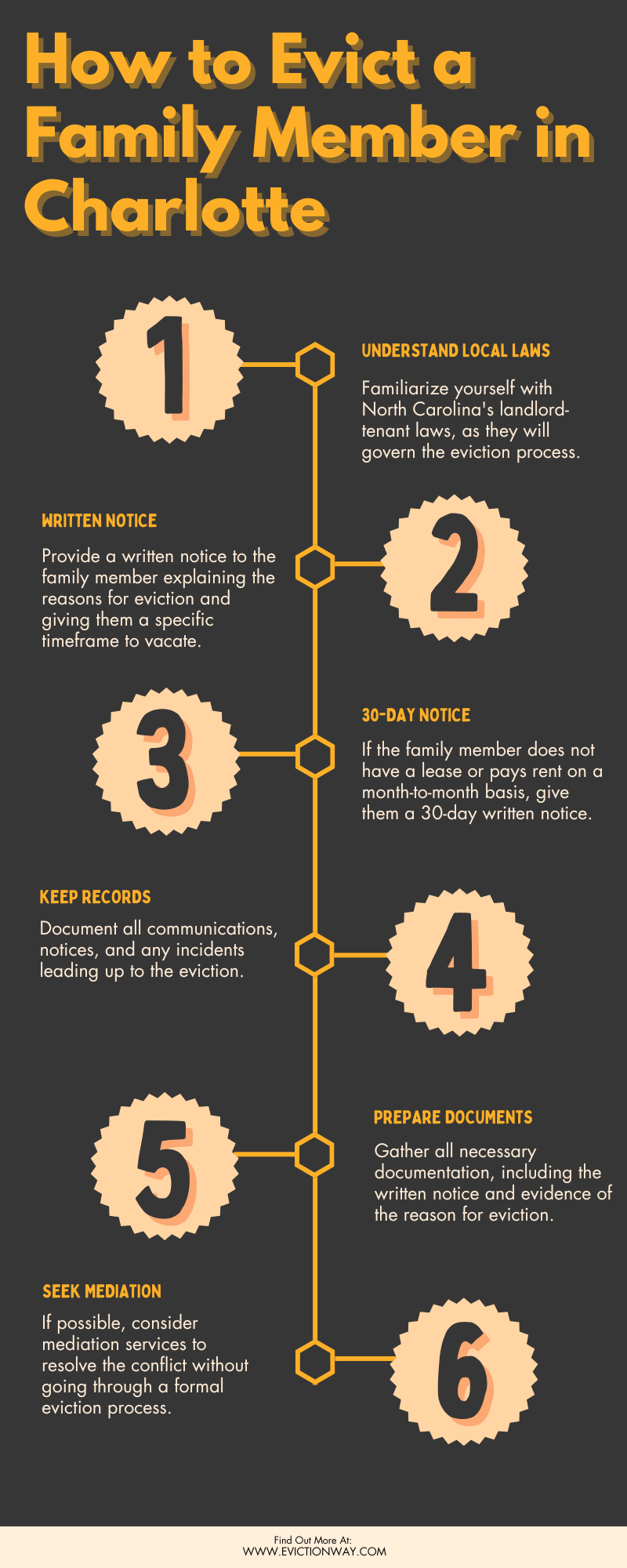Evicting a family member can be a difficult and emotional process, but it’s important to know your rights and options if you’re considering this step. In this blog post, we’ll share the best way to evict a family member in Charlotte, including the legal process and tips on how to do it politely.
First, it’s important to understand the legal process for evicting a family member in Charlotte. The specific steps may vary depending on your circumstances, but generally, you’ll need to give your family member written notice to vacate the property. If they don’t leave by the deadline, you can file an eviction lawsuit with the court. The court will then hold a hearing to determine whether or not to grant your request for eviction.
If you’re considering evicting a family member, it’s important to weigh the potential consequences carefully. Eviction can be a traumatic experience, and it can damage your relationship with your family member. If possible, it’s best to try to resolve the issue amicably before resorting to legal action. However, if you’ve exhausted all other options and you’re left with no choice but to evict your family member, it’s important to follow the legal process carefully to protect your rights.

How To Evict a Family Member In Charlotte
Evicting a family member is never easy, but it may be necessary to protect your rights and property. If you’re considering evicting a family member in Charlotte, here are six tips to help you through the process:
1. Document Everything
Keep a record of all communication with your family member, including phone calls, emails, and text messages. This will help you prove your case if you need to go to court.
2. Give Proper Notice
In Charlotte, you must give your family member at least 30 days’ written notice before you can evict them. The notice must state the reason for the eviction and the date by which they must vacate the property.

3. File a Complaint with the Court
If your family member does not vacate the property after receiving the notice, you will need to file a complaint with the court. The court will then schedule a hearing to determine whether or not you have the right to evict your family member.
4. Attend the Hearing
It is important to attend the hearing and present your case to the judge. Be prepared to answer questions about the eviction and provide evidence to support your claims.
5. Obtain a Judgment
If the judge rules in your favor, you will be granted a judgment of eviction. This judgment will give you the legal authority to remove your family member from the property.
6. Enforce the Judgment
Once you have obtained a judgment of eviction, you can hire a sheriff to enforce the judgment and remove your family member from the property.

Additional Resources for Charlotte, NC eviction help:
30 day eviction notice Charlotte
In Charlotte, a 30-day notice to quit for non-payment of rent is a document used by landlords to inform tenants they’ve missed rent. It gives the tenant 30 days from the date they receive the notice to do one of two things:
- Pay the rent in full
- Vacate the property
If the tenant doesn’t comply within the 30 days, the landlord can then proceed with filing an eviction lawsuit in court.
You can download 30 day eviction notice Charlotte here.
How Much Does it Cost to Evict a Family Member in Charlotte?
Evicting a family member is never easy, and the costs can add up quickly. In Charlotte, the average cost of an eviction is between $500 – $1,000 and more. This includes the cost of filing fees, court costs, and attorney fees. If you are representing yourself, you may be able to save some money, but it is still important to factor in the cost of your time and effort.
In addition to the direct costs of eviction, there are also indirect costs to consider. These costs can include the cost of finding a new place to live, moving expenses, and the emotional toll of being evicted. If you are considering evicting a family member, it is important to weigh the costs and benefits carefully.
| Cost | Estimated Amount | Description |
|---|---|---|
| Filing Fee | $96 | Fee to file a complaint with Mecklenburg County |
| Service of Summons | $30-~$75 | Cost to have someone serve the eviction notice |
| Court Costs | $100 | Variable depending on case complexity |
| Attorney Fees | $1,000 | Varies depending on lawyer experience and case |
| Late Fees | Varies | Potential late fees for missed court dates |
FAQs: Evicting a Family Member in Charlotte
Here are some of the most frequently asked questions about evicting a family member in Charlotte:
What are the grounds for evicting a family member in Charlotte?
In Charlotte, you can evict a family member for violating the terms of their tenancy, such as not paying rent or breaking the lease agreement. You can also evict a family member if they are causing damage to the property or engaging in illegal activities.
What is the process for evicting a family member in Charlotte?
The process for evicting a family member in Charlotte is similar to the process for evicting any other tenant. You must first give the family member a written notice to vacate the property. If the family member does not vacate the property within the specified time period, you can file an eviction lawsuit with the court.
Can I evict a family member if they are not on the lease?
Yes, you can evict a family member even if they are not on the lease. However, you must be able to prove that the family member is a tenant, such as by showing that they have been paying rent or living in the property for a period of time.
How long before a guest becomes a tenant in North Carolina?
In North Carolina, a guest generally becomes a tenant after 14 days. This is the timeframe after which a landlord can legally begin the eviction process if the guest is considered an “overstaying guest” and has not paid rent.
How long does an eviction stay on your record in North Carolina?
In North Carolina, an eviction stays on your record for 7 years. This information can be accessed by potential landlords and employers.
Can you stop an eviction by paying NC?
Yes, If the only reason you are being evicted is for non-payment of rent, you can stop the eviction process by paying the rent owed and any associated court costs at the eviction hearing.
How many days notice must be given to evict in NC?
In North Carolina, the required notice period for eviction depends on the reason for eviction. For non-payment of rent, it’s 10 days. For other reasons, it’s 30 days.
What forms do I need to file an eviction in NC?
In North Carolina, you’ll need to file a Summary Ejectment form with the clerk of court. You’ll also need a Notice to Quit form, which you must serve on the tenant before filing the lawsuit.
What are the legal implications of evicting a family member?
Evicting a family member can have serious legal implications. You should consult with an attorney before evicting a family member to make sure that you are following the proper legal procedures.
What are some tips for evicting a family member peacefully?
If possible, try to evict a family member peacefully. This may involve talking to the family member about the situation and trying to come to a mutually agreeable solution. You may also want to consider offering the family member financial assistance to help them find a new place to live.
Related:
How to Evict a Family Member in Elizabeth
